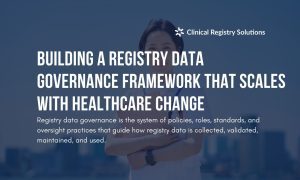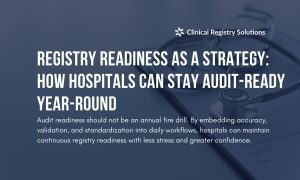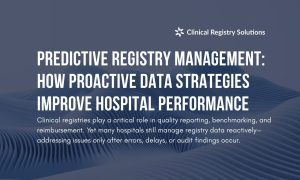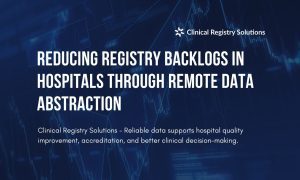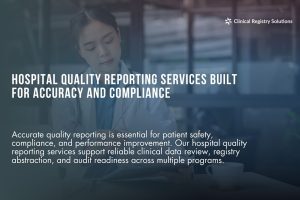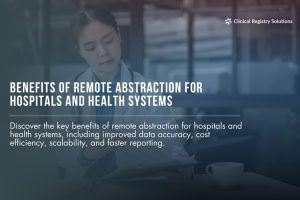Behind every informed medical decision lies a foundation of accurate, well-organized data. In an industry where outcomes, compliance, and quality care depend on timely insights, clinical data abstraction is crucial. By pulling relevant details from complex patient records, this process transforms raw clinical information into usable data, helping healthcare teams improve outcomes, streamline reporting, and reduce administrative strain.
It bridges the gap between clinical documentation and actionable intelligence. Without it, critical trends, patient risks, and care opportunities could easily go unnoticed.
What Is Clinical Data Abstraction and Why Is It Essential in Modern Healthcare?
It involves extracting critical clinical details from patient records, such as diagnoses, treatments, lab values, and outcomes, and organizing them into standardized fields. This process ensures consistency across multiple sources of data and supports registry submission and analytical platforms.
Proper medical data abstraction guarantees that each variable, from patient demographics to procedure codes, is captured accurately. Effective clinical data management then takes this information and ensures it is stored, audited, and ready for use in reports or benchmarking tools.
Key Benefits of Structured Data Abstraction
1. Accurate Reporting and Compliance
- Ensures registry submissions meet standards of accuracy and completeness
2. Improved Clinical Insights
- Enables hospitals to track performance trends, identify gaps in care, and drive quality initiatives
- Supports research and value-based care decision-making
3. Streamlining Workflows
- Abstracted data removes the burden from clinical staff who would otherwise search through unstructured charts
- Supports better collaboration across teams by providing consistent, standardized data
What Are the Steps to Achieving High-Quality Clinical Data Abstraction?
To deliver reliable results, organizations follow structured workflows:
- Define key data elements based on registry or regulatory requirements
- Train and certify abstractors who understand clinical terminology and registry rules
- Validate accuracy through internal audits and Inter-Rater Reliability (IRR) metrics
- Feed abstracted data into dashboards or reporting tools for leadership review
These steps are foundational elements of broader clinical data management strategies that keep data accurate, visible, and actionable.
Who Can Benefit Most from These Services
Healthcare leaders in a variety of settings rely on professional abstraction and registry support:
- Hospital and health system quality directors using registry data for accreditation and performance benchmarking
- Registry coordinators and data managers who need consistent, audit-ready submission workflows
- CROs and clinical trial sponsors needing precise data abstraction aligned with IRB or sponsor standards
By partnering with expert-led teams, healthcare providers can align quality and compliance goals without stretching internal teams too thin.
FAQs
1. What is the difference between clinical data abstraction and data entry?
It focuses on summarizing relevant clinical information, while data entry often handles administrative or billing details, which may not be clinically important.
2. Who performs medical data abstraction?
Typically, nurses, health information professionals, or certified abstractors are specially trained for registry-specific protocols and clinical standards.
3. How is accuracy verified in abstraction?
Many organizations measure accuracy through IRR scores (often over 97 %), internal audits, and ongoing reviewer training to uphold consistent standards.
4. Can abstraction handle specialty areas like oncology or pediatrics?
Yes. Specialized abstractor teams are trained to navigate specialty-specific data elements and registry criteria for areas such as cancer, cardiac surgery, or pediatric operations.
5. How does abstraction support clinical data management?
Once data is abstracted, it’s organized, audited, stored, and made accessible for quality improvement, value-based reporting, and strategic decision-making within the system.
Best Practices for Reliable Abstraction and Data Integrity
Healthcare organizations can optimize outcomes by:
- Standardizing protocols and registry checklists for consistent data capture
- Using certified clinical abstractors trained in registry formats
- Regularly auditing accuracy, reviewing IRR performance, and maintaining clear tracking
- Providing dashboards and summary reports that integrate clinical outcomes with administrative data
Strong abstraction paired with disciplined data governance is the foundation of effective clinical data management.
How Institutions Can Implement These Services
Some hospitals may opt for internal abstraction programs, but many find value in outsourcing:
- Supplemental support helps reduce backlog during accreditation periods or staffing shortages
- Full-service coverage ensures all registry data is handled by expert teams while staff focus on patient care
- Custom training and workflows allow internal staff to manage routine tasks with oversight and quality assurance
This aligns with the goals of accuracy, efficiency, and scalability.
Conclusion
Ultimately, clinical data abstraction and clinical data management are the backbone of reliable and actionable healthcare information. When done right, they streamline workflows, support research, ensure compliance, and empower staff to focus on patient care.
For healthcare teams seeking high accuracy, audit-readiness, and consistent communication, Clinical Registry Solutions provides clinician-led support that meets registry standards, improves operational efficiency, and helps teams thrive.
Want to improve reporting accuracy, reduce the burden on staff, and enhance data-driven decision-making? Contact Clinical Registry Solutions today to learn more about how expert abstraction and registry services can transform your organization.
